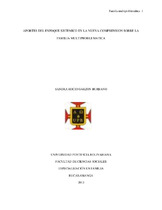Mostrar el registro sencillo del ítem
Aportes del enfoque sistémico en la nueva comprensión sobre la familia multiproblematic
| dc.contributor.advisor | Acevedo Rodríguez, Magda Yaneth | |
| dc.contributor.author | Garzón Burbano, Sandra Rocío | |
| dc.coverage.temporal | 2013 | |
| dc.date.accessioned | 2020-09-03T15:32:33Z | |
| dc.date.available | 2020-09-03T15:32:33Z | |
| dc.date.issued | 2013 | |
| dc.identifier.uri | http://hdl.handle.net/20.500.11912/5913 | |
| dc.description | 63 páginas | spa |
| dc.description.abstract | La familia representa para los profesionales de las áreas sociales y humanas, un importante espacio de trabajo que merece reconocimiento y atención, más aun cuando se trata de familias multiproblemáticas, en este sentido el objetivo de la presente monografía fue comprenderla desde el enfoque sistémico y modelo ecológico, identificando sus aportes en la intervención profesional de los equipos interdisciplinarios que laboran en el Centro Zonal Luis Carlos Galán Sarmiento del ICBF en Bucaramanga, así entonces, se buscó identificar las características de la familia multiproblemática, establecer los cambios y movilizaciones que se presentan en su tipología y ciclo vital y conocer las estrategias de intervención familiar desde el enfoque sistémico, fundamentándose en el modelo ecológico, el cual permite tener una perspectiva más amplia y por lo tanto una mayor comprensión sobre la familia multiproblemática, para ello, se realizó un recorrido teórico que abarca el marco legal Colombiano que la protege, el marco institucional, el concepto de familia como sistema, la teoría general de sistemas, el modelo sistémico y ecológico y la conceptualización de la familia multiproblemática más sus características, tipología y ciclo vital, además de las estrategias de intervención y estudios e investigaciones al respecto. Durante dicho recorrido se estableció que gracias a las características y particularidades de la familia multiproblemática se requiere de estrategias de intervención que tengan objetivos claros y consideraciones que permitan adelantar un proceso acorde con su realidad, reconociendo que el enfoque sistémico y modelo ecológico son en sí mismos un aporte fundamental para su identificación, comprensión y para el proceso de intervención que desde la misma concepción del hombre como ser social, permite analizar las interacciones entre los miembros del grupo familiar y por supuesto también las presentes en los demás sistemas que le influyen e intervienen teniendo como eje principal la comunicación. | spa |
| dc.description.abstract | The family represents for professionals of the social and human fields an important area of study that deserves recognition and attention, especially in the case of multi-problematic families. In this regard, the goal of this thesis is to understand the family from the systemic approach and the ecological model, identifying their contributions in the professional interventions of the interdisciplinary teams that work at the Centro Zonal Luis Carlos Galin Sarmiento from the ICBF in Bucaramanga. This thesis attempts to identify the characteristics of the multi-problematic family, to establish the changes and mobilizations that are presented in its typology and life cycle and to know the family intervention strategies from the systemic approach, based on the ecological model which allows for a broader perspective and therefore a greater understanding of the multi-problematic family. In order to achieve that, one performs a theoretical journey that encompasses the Colombian legal frame work that protects the family, the institutional framework, the concept of family as a system, the general systems theory, the systemic and ecological model, and the conceptualization of the multi-problematic family plus the family's characteristics, typology and life cycle in addition to intervention strategies and studies and researches in this field. During this journey one establish that, thanks to the characteristics and particularities of the multi-problematic family, intervention strategies with clear goals and considerations are required in order to bring forward a process in accordance with the family's reality, recognizing that the systemic approach and ecological model are in themselves a fundamental contribution for its identification and understanding and for its intervention process as well; that from the same conception of men as a social being, allows to analyze the interactions among the family members and also the interactions that are present in the other systems that influence and intervene that have the communication as a main axis. | eng |
| dc.format.mimetype | application/pdf | |
| dc.language.iso | spa | |
| dc.publisher | Universidad Pontificia Bolivariana | spa |
| dc.rights | Attribution-NonCommercial-NoDerivatives 4.0 International | * |
| dc.rights.uri | http://creativecommons.org/licenses/by-nc-nd/4.0/ | * |
| dc.subject | Problemas familiares | spa |
| dc.subject | Instituciones públicas - Instituto Colombiano de Bienestar Familiar ICBF | spa |
| dc.subject | Intervención psicológica | spa |
| dc.title | Aportes del enfoque sistémico en la nueva comprensión sobre la familia multiproblematic | spa |
| dc.type | Especialización | spa |
| dc.publisher.department | Escuela de Ciencias Sociales | spa |
| dc.publisher.program | Especialización en Familia | spa |
| dc.type.hasVersion | publishedVersion | spa |
| dc.description.sectional | Bucaramanga | spa |
| dc.description.degreename | Especialista en Familia | spa |
Ficheros en el ítem
Este ítem aparece en la(s) siguiente(s) colección(ones)
-
Trabajos de grado [6695]
Monografías, artículos, informes, proyecto de grado


